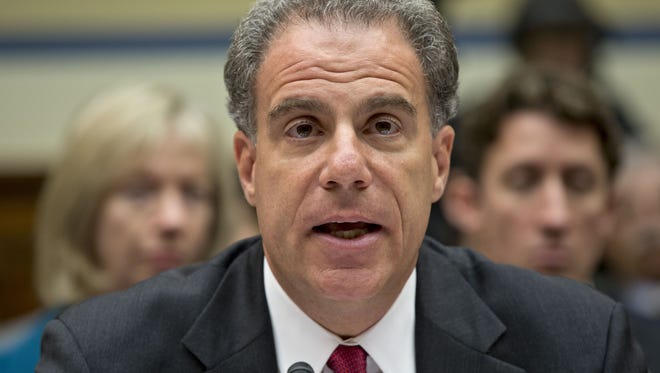WASHINGTON, (Reuters) – The U.S. Justice Department’s internal watchdog said it found numerous errors but no evidence of political bias by the FBI when it opened an investigation into contacts between Donald Trump’s presidential campaign and Russia in 2016.
The report by Inspector General Michael Horowitz gave ammunition to both Trump’s supporters and his Democratic critics in the debate about the legitimacy of an investigation that clouded the first two years of his presidency.
It will not be the last word on the subject.
Federal prosecutor John Durham, who is running a separate criminal investigation on the origins of the Russia probe, said he did not agree with some of the report’s conclusions.
Attorney General William Barr, who ordered the Durham investigation, said the report showed that the FBI launched its investigation “on the thinnest of suspicions.”
Horowitz found that the FBI had a legal “authorized purpose” to ask for court approval to begin surveillance of Carter Page, a former Trump campaign adviser.
But Horowitz also found a total of 17 “basic and fundamental” errors and omissions in the original application and all subsequent renewals to the Foreign Intelligence Surveillance Court (FISA). Those errors made the case appear stronger than it was, Horowitz said.
In particular, the report singled out an FBI lawyer who altered an email contained in a renewal of the application which claimed that Page was “not a source” to another U.S. government agency.
In truth, Page served from 2008 to 2013 as a “operational contact” to another agency, which was not identified in the report.
The lawyer was previously identified by Republican Representative Mark Meadows as Kevin Clinesmith, who is no longer with the agency. Clinesmith, former FBI attorney Lisa Page and former special agent Peter Strzok were among a group of FBI employees found by Horowitz last year to have exchanged text messages critical of Trump.
Clinesmith did not immediately respond to a request for comment.
“This was an attempted overthrow and a lot of people were in on it, and they got caught,” Trump told reporters at the White House in reaction to the report.
The FBI investigation, opened in the summer of 2016 ahead of the November election pitting Trump against Democratic candidate Hillary Clinton, was taken over in May 2017 by former FBI chief Robert Mueller after Trump fired James Comey as the agency’s director.
Mueller’s 22-month special counsel investigation detailed a Russian campaign of hacking and propaganda to sow discord in the United States, harm Clinton and boost Trump. Mueller documented numerous contacts between Trump campaign figures and Moscow but found insufficient evidence of a criminal conspiracy.
Trump called the investigation, known within the FBI as Operation Crossfire Hurricane, a witch hunt and assailedFBI leaders and career staffers who worked on it.
Republican lawmakers said it showed that law-enforcement officials had abused their power.
“In any other instance, an administration using the weight of the federal government to spy on the campaign of a political rival would be a national scandal,” Representative Steve Scalise, the No. 3 House of Representatives Republican, said in a statement.
Democrats said the report showed that the FBI conducted a legitimate investigation.
“It was never a witch hunt. It was the men and women of federal law enforcement doing their jobs,” Democratic Senator Mark Warner said on Twitter.
FBI Director Christopher Wray said he had ordered 40 steps, such as changes to warrant applications and methods for dealing with informants, to fix problems highlighted in the report. The FBI would review the conduct of employees mentioned in the report, Wray said.
Horowitz said his office on Monday began a new review to further scrutinize the FBI’s compliance with its own fact-checking policies used to get applications to surveil U.S. persons in counterterrorism investigations, as well as counterintelligence probes.
Operation Crossfire Hurricane opened on July 31, 2016, after the FBI received a tip from a foreign ally that Trump adviser George Papadopoulos suggested he had offers of help from Russia.
Horowitz found that the FBI relied heavily on research assembled by former British spy Christopher Steele when it asked for court permission to open a wiretap on Page.
But the FBI did not tell the Justice Department or the FISA court that that material gathered by Steele was internally inconsistent in some respects.
The FBI continued its surveillance of Page after Trump’s election even though two agents said it was not necessary because they thought he was irrelevant to the investigation.
Steele assembled his dossier for an opposition-research firm that was funded by the Democratic Party. Trump’s allies say the FBI should have disclosed that fact in its warrant application.
Horowitz will testify about his findings at a public hearing before the Senate Judiciary Committee on Wednesday.






